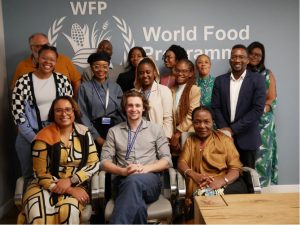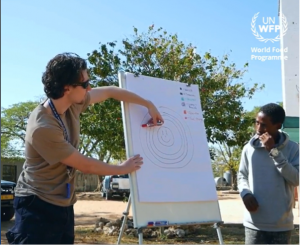This post was written by Ben Moore, a student of BSc International Disaster Management & Humanitarian Response at HCRI. Thank you for sharing your experience Ben!
Over the summer, I had the privilege of volunteering with the World Food Programme (WFP) Namibia as a United Nations (UN) Volunteer. Though a relatively small office with about 30 people, WFP is the largest UN cluster in Namibia and plays a crucial role in tackling food insecurity in the region. During my three months there, I was immersed in the culture and challenges of a country I’ve grown to love, gaining insights that will shape my career in the humanitarian sector. In this post, I’ll share some of the honest lessons I learnt from being an international UN Volunteer – lessons that I hope will be beneficial for those considering a similar path.

Ben with colleagues from WFP Namibia
1. Know your Motivation
Firstly, if you wish to work for the UN, you should ask yourself why?
What are your drivers to work for this organisation?
It is undoubtedly true that working for the UN carries a certain prestige, you have your own passport, a sense of admiration and the enjoyment of working alongside incredibly clever individuals.
However, it’s important to understand and enjoy the fact that the realities of work will ground you. You can be stuck behind a desk for weeks, working long hours on monotonous tasks. It is certainly not the case that you will “be a hero”. Much of the work involves research, programme design and rigorous processes to ensure projects are sustainable and genuinely beneficial (rightfully so).
2. Be ready for criticism
Working for a large multilateral organization like the UN does attract criticism, particularly within certain academic and public spheres. Some see the UN as the US by proxy or as an imposing value that may not align with cultures or political contexts. As a result, you may face opposition or scepticism about your role, particularly in regions with a tense historical relationship with the UN.
It’s important to be prepared for such critiques and to recognise that not everyone will view your work through the same lens. How you choose to engage with or respond to this criticism will depend on your own outlook and understanding of the issues at hand.
Additionally, working at the UN offers the opportunity to reflect on how values are communicated and implemented across diverse cultural contexts. For those from Western backgrounds, it is a chance to reconsider how international interventions are perceived and what assumptions are carried into global development work.

Value-addition training at Stampriet
3. Adapt to the culture
In many international organisations like WFP, country-based staff make up the majority of the workforce. In the Namibia country office, as in many others, most of the team was made up of country-based staff, with international employees making up approximately 20% of the office. Of these, only about 5% of whom where not from Sub-Saharan Africa. These numbers are an indicator of how central country-based expertise is within WFP, a significant strength: relying on domestic staff can ensure a better understanding of local issues and a culturally informed approach.
As someone who has grown up in the West, adjusting to the unique workplace culture of a different country can be a challenging yet valuable experience. I noticed how conditioned we can be to Western norms in the workplace; adapting to new ways of working made me aware of the contrasts. Even within the UN, an organisation with western origins, the culture of the country is the decisive factor – ranging from managerial decision-making, the attitude of HR or office hours. Coming from a Western country, this experience pushed me to re-evaluate the way I approach work and learn from my surroundings.
4. Understand the financial realities
One of the most contentious issues with UN volunteering is that it is unpaid and expensive. Volunteers take on responsibilities akin to those of an intern, but given the title volunteer to avoid compensation. The role, while rewarding in other ways, comes at a significant financial burden. Only accessible to those with the means to support themselves for six months to a year without pay. If you’re looking to work internationally, prepare to cover your flights, accommodation, and food costs. Take any chance you get to go on a field trip as bed and breakfast can be covered.
A serious review needs to be undertaken by the UN on the implications and ethicality of these policies. The structure arguably restricts opportunities to those who can afford them, leaving untapped the potential pool of talented individuals who otherwise benefit and contribute meaningfully to the organisation.

Community Engagement exercise at Ondera Farm
5. Leverage the network
To the UN, your CV boost is considered worthy compensation for the lack of pay. The global reputation suggests this experience will carry weight, though it may shape others’ perception in the process.
Alongside the CV booster, the real career benefit is the mentoring you receive – a part of the experience I hadn’t fully appreciated before volunteering. A mentor here offers more than career advice; they can bring a network, targeted skill development, and most importantly, guidance grounded in experience. My mentors shared knowledge and advice not found in any report or dataset from one-to-one conversations.
6. Immerse fully
Jumping into the experience with both feet is the best approach to fully benefit from volunteering. While having the hard infrastructure of a reference, an addition to your CV, or even a mentor can be valuable, none of these compared to the general knowledge and insights I gained from fully engaging with the environment.
The true essence of what many refer to as “life experience” lies in the unknown knowledge acquired through immersion. It’s about the everyday interactions, the cultural nuances, and the unplanned moments that teach you the most.
In conclusion, volunteering with WFP Namibia provided me with valuable insights into the realities of humanitarian work and the cultural dynamics within an international organisation. Working for the UN comes with both advantages and disadvantages, including the lack of pay and costs incurred, the need to adapt quickly to challenging work environment, and the opportunity to engage with local perspectives.
Further resources:
If you’re interested in exploring opportunities within the UN, I encourage you to check out Young Professionals Programme (YPP) and Junior Professional Officer (JPO) fast-track schemes. Keep in mind that these are only open to certain nationalities and involve a competitive selection process.
Additionally, a new app called UN Jobs uses AI to help you find job applications online, which as been a helpful tool for my own research. If you’re considering becoming a UN volunteer, this app will show external applications and their requirements. I also recommend emailing and initiating direct contact with relevant organisations.
- UN Jobs app: https://apps.apple.com/gb/app/un-jobs/id6469009497
Photo Credit: Joseph Lilonga
